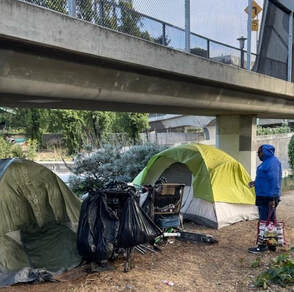 Our own Kevin Carter, after he attended Sunday Mass, feeding the homeless in San Francisco
Our own Kevin Carter, after he attended Sunday Mass, feeding the homeless in San Francisco 5000 Men
Most of us have had our breakfast, and most of us are thinking about lunch already (as you sit through my morning sermon). Food consumes a good deal of our thoughts. Today the Gospel describes one of Our Lord’s more popular miracles, the feeding of 5000 men, not counting women and children. If these men brought their wives and children (and Jewish families at that time were large), then the crowd would be well over 30,000. All of these people were fed with the one dinner surrendered by one boy, a dinner of five “barley loaves” (the size of large dinner rolls) and two fish. Not until October 13, 1917, would more people witness a miracle together, when 70,000 saw the miracle of the sun at Fatima, Portugal. The multiplication of loaves is the most “popular” miracle of the bible—popular in the sense that the most people saw it, and also popular in the sense that it enjoys wide appeal, because we are all foodies at heart.
Doubt
But this most spectacular of miracles begins with a question, and a doubt. In fact, the question is asked three times in today’s scriptures, beginning with the first reading, from Second Kings. “A man from Baal-Shalishah brings Elisha, the man of God, 20 barley loaves. “How can I set this before a hundred people?” he asks. Elisha insists: do it. “And when they had eaten, there was some left over.” 600 years later Philip the Apostle asks Jesus the same question: “there is a boy here with five barley loaves, but what good are these for so many?” Jesus replies: “have the people recline on the grass.” 30,000 men, women and children eat their fill, with 12 baskets left over. Our take away is that we can, and we must, trust God, because He provides.
But the miracles did not stop with Christ’s resurrection and ascension. Among many saints, Fr. John Bosco, an Italian diocesan priest who founded the Salesian Order in 1859 to provide schools for the street children of Italy’s industrial cities, also witnessed God’s providence. One day he began handing out bagels for 300 boys from a basket that had a few dozen. With great wonder they saw him distribute to all the present, with bagels left over. Another time he began distributing some roasted chestnuts to 650 young people. The supply never ended, again with some left over. In 1848 the sacristan forgot to put hosts on the altar for a Mass with hundreds of young people. Don Bosco raised his eyes to heaven, prayed and then began distributing Holy Communion. Without breaking the Hosts, Don Bosco was able to give Communion to all the boys. Closer to home, Raymond Arroyo told the story of Mother Angelica from this pulpit a few years ago. She ordered a satellite that cost $250K because she needed it but didn’t have the money. It arrived, and she couldn’t pay, so she went into the chapel and said to Jesus “Your transmitter is here.” A phone call came in with that precise amount just as the truck driver was getting ready to take the satellite back.
God Never Loses
I attended a remarkable conference last week, the Napa Institute, in which the speakers clearly defined the unprecedented loss of faith in our time, the coordinated efforts of media giants, universities, and world governments to discredit and erase Christianity. But these speakers even more clearly defined the hope within us, one of them quoting St. Josemaria Escriva: “God never loses. Not even one battle.” If it seems like we have lost the culture war, that the culture of death has overcome the gospel of life, if it seems that our children and our college students are helpless against dictatorial ideologies that destroy their families, their minds, and their very identities, do not doubt God’s providence. Jesus is Lord, and He never loses.
His Image and Likeness
But back to the question and the doubt: “where can we find enough food?” Why did the Lord ask St. Philip that question? “He said this,” St. John tells us, “to test him, because he himself knew what he was going to do.” These men needed to know that they cannot possibly, ever, feed the hungry without God’s help. Every Sunday half a dozen people in our parish spend a few hours and a few hundred dollars preparing sandwiches, burritos, and fruit for the street people. They go into the tenderloin to feed the lower classes who have been given opioids and abortion, gender ideology and racial ideologies, in place of God’s truth and God’s love. Rosa and Saori and Kevin and Claudia and Eva give them sandwiches, coats, blankets, and a loving smile, but they would never dare do this before spending an hour or two before the Blessed Sacrament, and attending the Holy Mass. The people that serve the poor best, like St. Francis and Mother Teresa, are the people that pray the most. God never loses, but we will lose unless we depend entirely on Him. With God, all things are possible, and all things are bright and beautiful, even the filthy street encampments in San Francisco’s Tenderloin district. People are always beautiful, because they are God’s image and likeness. Let us pray.


 RSS Feed
RSS Feed